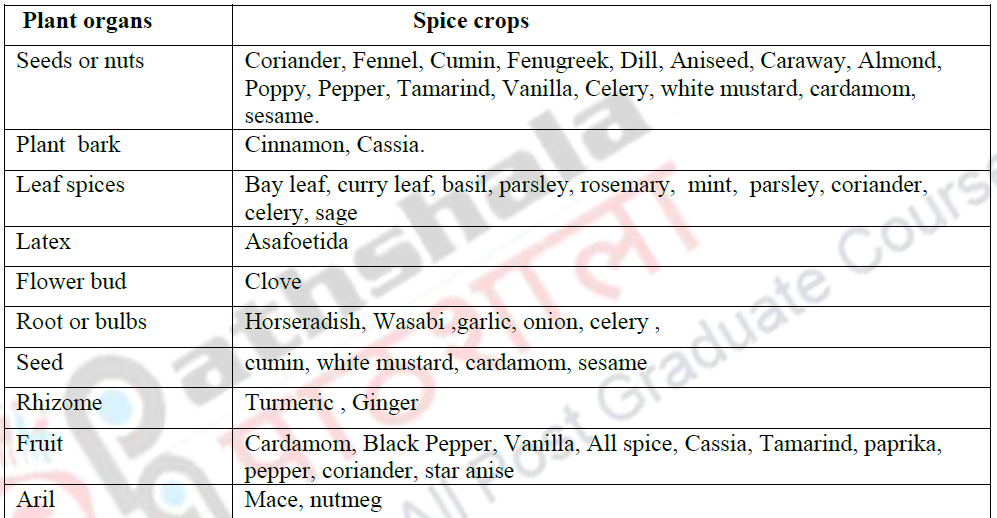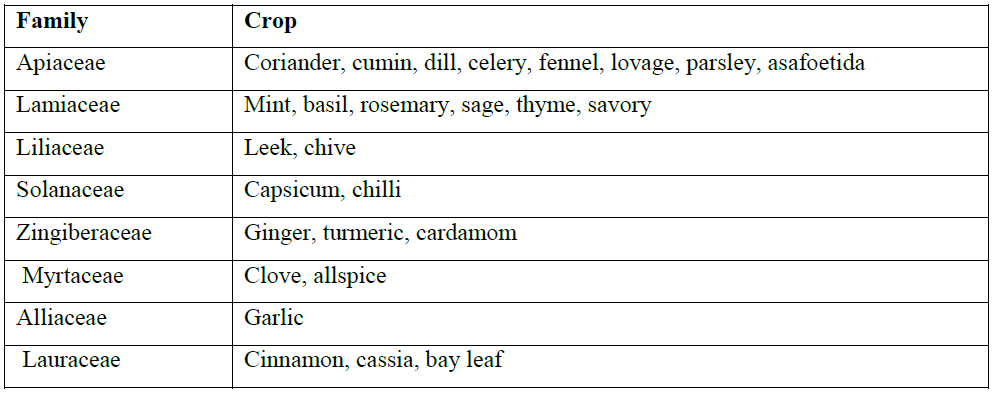5 Nomenclature & classification of spices and condiments
5.1. Nomenclature of spices and condiments:
1. Cardamom (Small)
Botanical name: Elettaria cardamomum
Family name: Maton Zingiberaceae
Part used as spice: Fruit, seed
2. Cardamom (Large)
Botanical name: Amomum subulatum
Family name: Roxb. Zingiberaceae
Part used as spice: Fruit, Seed
3. Pepper
Botanical name: Piper nigrum
Family name: L.Piperaceae
Part used as spice: Fruit
4. Chilli
Botanical name: Capsicum annuum
Family name: L. Solanaceae
Part used as spice: Fruit
5. Ginger
Botanical name: Zingiber officinale Rosc
Family name: Zingiberaceae
Part used as spice: Rhizome
6. Turmeric
Botanical name: Curcuma longa L.
Family name: Zingiberaceae
Part used as spice: Rhizome
7. Coriander
Botanical name: Coriandrum sativum L.
Family name: Apiaceae
Part used as spice: Leaf & Fruit
8. Cumin
Botanical name: Cuminum cyminum L.
Family name: Apiaceae
Part used as spice: Fruit
9. Fennel
Botanical name: Foeniculum vulgare Mill.
Family name: Apiaceae
Part used as spice: Fruit
10. Fenugreek
Botanical name: Trigonella foenum-graecum L.
Family name: Fabaceae
Part used as spice: Seed
11. Cinnamon
Botanical name: Cinnamomum zeylanicum
Family name: Breyn Lauraceae
Part used as spice: Bark
12. Garlic
Botanical name: Allium sativum L.
Family name: Alliaceae
Part used as spice: Bulb
13. Clove
Botanical name: Syzygium aromaticum (L)
Family name: Merr. & Perry Myrtaceae
Part used as spice: Unopened Flower bud
14. Tamarind
Botanical name: Tamarindus indica L.
Family name: Caesalpiniaceae
Part used as spice: Fruit
15. Celery
Botanical name: Apium graveolens L.
Family name: Apiaceae
Part used as spice: Leaf, Fruit, Stem
16. Caraway
Botanical name: Carum carvi L.
Family name: Apiaceae
Part used as spice: Fruit
17. Mint
Botanical name: Mentha piperita L.
Family name: Lamiaceae
Part used as spice: Leaf
18. Mustard
Botanical name: Brassica juncea L.
Family name: Czern Brassicaceae
Part used as spice: Seed
19. Saffron
Botanical name: Crocus sativus L.
Family name: Iridaceae
Part used as spice: Stigma
20. Mace
Family name: Myristica fragrans Houtt.
Botanical name: Myristicaceae
Part used as spice: Aril
21. Basil
Family name: Ocimum basilicum L.
Botanical name: Lamiaceae
Part used as spice: Leaf
22. Dill
Botanical name: Anethum graveolens L.
Family name: Apiacee
Part used as spice: Fruit
23. Parsley
Botanical name: Petroselinum crispum Mill.
Family name: Apiaceae
Part used as spice: Leaf
24. Cassia
Botanical name: Cinnamomum cassia.Blume
Family name: Lauraceae
Part used as spice: Bark
25. Aniseed
Botanical name: Pimpinella anisum L.
Family name: Apiaceae
Part used as spice: Fruit
26. Thyme
Botanical name: Thymus vulgaris L.
Family name: Lamiaceae
Part used as spice: Leaf
27. Savory
Botanical name: Satureja hortensis L.
Family name: Lamiaceae
Part used as spice: Leaf
28. Sage
Botanical name: Salvia officinalis L.
Family name: Lamiaceae
Part used as spice: Leaf
29. Rosemary
Botanical name: Rosmarinus officinalis L.
Family name: Lamiaceae
Part used as spice: Leaf
30. Allspice
Botanical name: Pimentadioica (L) Merr.
Family name: Myrtaceae
Part used as spice: Fruit & Leaf
31. Nutmeg
Botanical name: Myristica fragrans Houtt.
Family name: Myristicaceae
Part used as spice: Seed
32. Bay Leaf
Botanical name: Laurus nobilis L.
Family name: Lauraceae
Part used as spice: Leaf
33. Asafoetida
Botanical name: Ferula asafoetida L
Family name: Apiaceae
Part used as spice: Oleo gum resin from rhizome and thickened root
34. Horse Radish
Botanical name: Armoraciarusticana Gaertn.
Family name: Brassicaceae
Part used as spice: Root
35. Tejpat
Botanical name: Cinnamomum tamala (Buch Ham)
Family name: Lauraceae
Part used as spice: Bark, Leaf
36. Capsicum
Botanical name: Capsicum annuum L.
Family name: Solanaceae
Part used as spice: Fruit
5.2. Classification of Spices:
Spices can be classified or grouped according to different systems of classification such as:
5.2.1. Classification based upon the plant organ from which they are obtained:
5.2.2. Classification of spices based on Botanical families:
5.2.3. Classification based on duration of crop:
Annual basil, coriander, dill
Biennial caraway, parsley, leek
Perennial curry leaf, mint, oregano, thyme
5.2.4. Classification based on growth habit:
Herbs caraway, coriander, mint,
Shrubs rosemary, sage, thyme
Trees curry leaf, laurel
5.2.5. Conventional classification of spices:
5.2.6. Classification of condiments:
Spices have substantial antioxidant activity due to phenolic compounds mostly flavonoids present in them. These antioxidants may also act as natural preservatives by preventing or slowing spoilage of foods.
| you can view video on Nomenclature & Classification of Spices and Condiments |






